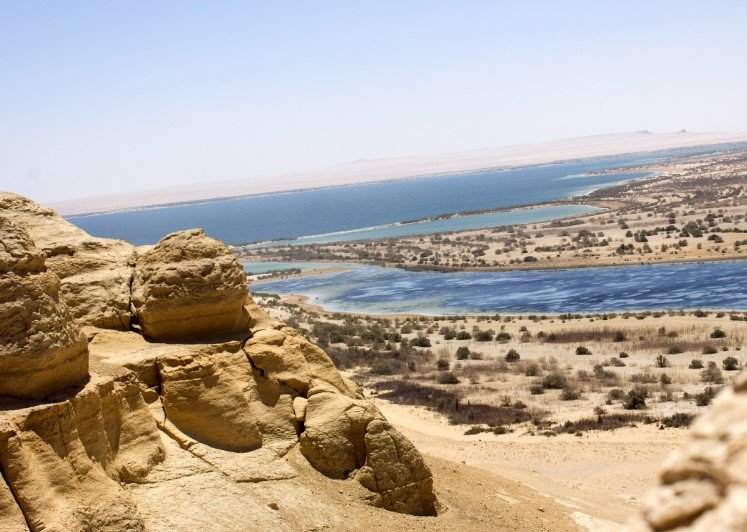Egypt has taken a big step toward building its first geopark in the Fayoum region as part of growing ties with UNESCO on protecting nature and biodiversity. Officials met on September 2, 2025, in the New Administrative Capital to map out these plans, focusing on how this move can boost environmental efforts and draw global attention.
This push comes at a time when countries worldwide are ramping up conservation amid climate challenges. The Fayoum area, known for its rich fossils and landscapes, could become a key site for education and tourism while safeguarding unique natural features.
Key Talks Between Egypt and UNESCO Leaders
Minister Manal Awad, who handles local development and acts as environment minister, sat down with Nuria Sanz, UNESCO’s regional director for Cairo and Sudan. They covered ways to strengthen joint work on environmental issues.
A team from Cairo University and the Egyptian Environmental Affairs Agency is already setting standards for the new geopark. This group aims to ensure the site meets international rules for protecting geological wonders.
The meeting also touched on Egypt’s role in global forums. Sanz invited Egypt to join the Fifth World Congress of Biosphere Reserves in China later in September 2025. About 3,000 experts from 136 countries will attend to shape a 10-year plan tied to UN goals on sustainability and climate.
Egypt’s track record, including hosting COP27 in 2022, positions it as a leader in these talks. Leaders see this as a chance to share lessons on balancing development with nature protection.

Why Fayoum Stands Out for a Geopark
Fayoum’s diverse terrain makes it ideal for Egypt’s first geopark. The area features ancient whale fossils in Wadi El-Hitan, a UNESCO World Heritage site, along with lakes, deserts, and oases that tell Earth’s story over millions of years.
Geoparks promote science, education, and eco-tourism without harming the environment. For Egypt, this could create jobs and attract visitors interested in history and nature.
Recent studies show Fayoum holds unique biodiversity, with species not found elsewhere. Protecting it aligns with global efforts to fight habitat loss, especially as temperatures rise.
Officials plan to link the geopark with local communities for sustainable growth. This includes training programs and eco-friendly businesses.
Experts predict the geopark could boost Egypt’s economy by 15 percent in tourism revenue for the region, based on similar sites worldwide.
Expanding Environmental Protection Efforts
Beyond Fayoum, Egypt aims to declare new national marine parks to shield coastal areas from pollution and overfishing.
Plans also include naming Saint Catherine as a cultural reserve, blending heritage with nature conservation.
These steps build on ongoing work with UNESCO. Egypt has managed several biosphere reserves successfully, showing commitment to global standards.
Cooperation extends to the Barcelona Convention meeting in December 2025, where Mediterranean sea protection will be a focus.
| Initiative | Location | Key Focus | Expected Impact |
|---|---|---|---|
| Fayoum Geopark | Fayoum Region | Geological heritage and education | Increased tourism and research |
| New Marine Parks | Coastal areas | Biodiversity in seas | Reduced pollution and species protection |
| Saint Catherine Reserve | Sinai Peninsula | Cultural and natural sites | Community involvement and preservation |
This table highlights how these projects connect to broader goals.
Invitation to Global Biosphere Congress
The upcoming congress in China marks a pivotal moment for international environmental strategy. Egypt’s participation could highlight its successes and influence future policies.
Topics will include aligning with the Paris Climate Agreement and UN sustainable development goals. Leaders expect discussions on innovative ways to protect biodiversity amid growing threats like deforestation.
Egypt plans to showcase its experiences, such as managing reserves during economic growth. This could inspire other nations facing similar challenges.
Egypt’s Track Record in Biosphere Reserves
Egypt already boasts several UNESCO-recognized sites that protect diverse ecosystems.
- Wadi El Rayan: Known for its wetlands and bird species, it supports research on water conservation.
- El Omayed: Focuses on coastal dunes and Mediterranean flora, aiding climate studies.
- Saint Catherine: Protects mountainous areas with rare plants and historical monasteries.
- Wadi El-Hitan: Famous for fossil whales, it educates on ancient marine life.
These reserves have helped preserve over 1,000 species and drawn international funding for sustainability projects.
Management involves local input, ensuring benefits reach communities. Recent data from 2025 shows a 20 percent rise in protected areas across Egypt, thanks to such partnerships.
Looking Ahead to Stronger Ties
These developments signal Egypt’s push for greener policies in 2025 and beyond. With UNESCO’s support, the Fayoum geopark could set a model for Africa and the Middle East.
As climate talks heat up globally, Egypt’s moves tie into events like the recent UN Habitat meetings on urban development and climate adaptation.
Share your thoughts on how geoparks can help the environment. Comment below or spread the word to raise awareness about these vital efforts.
